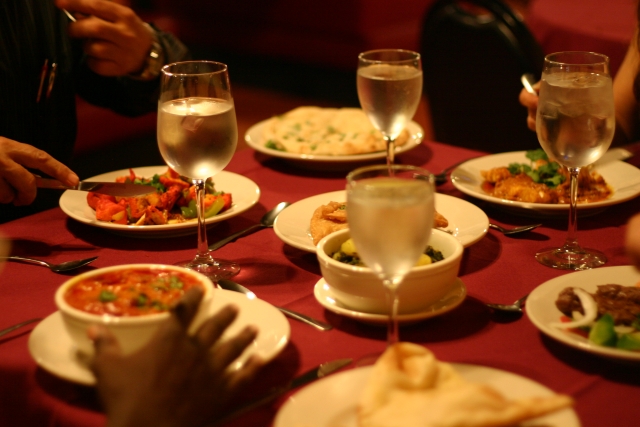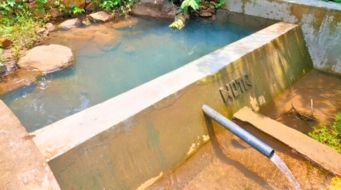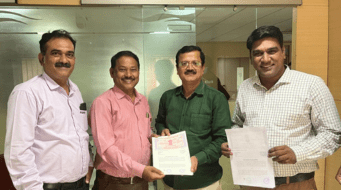-Nitesh Rikame
Working with WOTR for a considerable amount of time now, I’ve got exposed to the issues surrounding water crisis. I’ve learnt about the impact it has on the day-to-day life of people and the economy of the rural India. Alongside this, I also got acquainted with the collective efforts taken by the rural communities to counter this issue in the support of WOTR team. It has been an overwhelming experience to understand the perception of the rural population towards such problems, while simultaneously witnessing the positively changing ecosystem and economy. By taking all these experiences back to an urban space, where I reside, I have subconsciously become more vigilant towards the use of water. Also, it was shocking to read and discover the data on urban mismanagement, misuse of water and its contribution to depleting water resources and the projected crises of the future. This article is an attempt to put forth my personal experiences and also, appeal to the community around me to contribute and try to halt the fast-rising issue of water crisis.

Once while I was visiting a restaurant, I looked around and noticed the number of half-filled glasses of water kept on the dining tables. I kept wondering how much amount of water gets wasted at the end of every meal. And to get the this number for the whole city, simply multiply the number by lakhs.

Through research, I learnt that 14 million litres of water gets wasted in restaurants every year because of people like me. But this is just the restaurants! About 124 million litres per day (MLD) is lost from the total quantity of water supplied to the city due to illegal connections and leakages.
I have been paying water bills regularly. During water shortages, sometimes I even have to pay for private water tankers. But if we don’t take steps right now to conserve and manage water, perhaps, no amount of money will be enough to buy us water. As Cape Town inches towards ‘Zero Hour’ set for July 15, 2018, the real threat of water scarcity is finally hitting millions of people worldwide. For on that day, the South African city’s 3.78 million citizens — rich and poor, young and old, men and women — will be forced to queue up with their jerry cans at public outlets for their quota of 25 liters of water per day.

But even as the world is letting out a collective sigh for Cape Town, spare a thought for India. By 2040, there will be no drinking water in almost all of India. A UN report on water conservation published in March 2017 reveals that due to its unique geographical position in South Asia, the Indian sub-continent will face the brunt of the water crisis and India would be at the epicenter of this conflict.
So, what’s the solution?
“You can’t just expect things to happen, you want to see something change, you need to get up and go change it.”
Because it’s not the restaurant, it’s you!

It’s not the city, it’s you!

So, how to save water in daily life?
We rely on water for a wide variety of uses everyday. So, there are many ways in which one can save water on a daily basis. Here’s how to save water in your everyday life.
- Turn off the taps when not in use
Save 6 litres of water a minute by turning off your tap while you brush your teeth. Fix leaky taps too and stop what could be 60 litres of water going straight down the drain every week. Don’t let your water consumption run out of your control.
- Boil only what you need
Save water, money and energy by boiling only as many cups of water as you need.
- Shower with less
Every minute you spend in a power shower uses up to 17 litres of water . Set a timer on your phone to keep your showers short and thus, water-saving. Also, switching to an efficient shower head will allow you to lather up in less water, which means you’ll save water and cut your bills too.
- Save up your dirty clothes
Washing a full machine load of clothes uses less water and energy than 2 half-loads . This also means decreased electricity bills.
- Get a low-flush toilet
An average household flushes the loo 5,000 times per year . Modern dual-flush systems save huge amount of water as they use 6 litres – or 4 with a reduced flush – much less than the 13 litres for old-style single flush. If you can’t afford to invest in a new loo, get a water-saving bag for your old-style toilet .
- Eat less meat
Rearing animals for meat and dairy is incredibly water-intensive. By cutting down on the amount of meat you eat, you can slash your water use footprint drastically.
- Steam your veggies
Steam your food to cut water usage. It will also help in retaining more of the natural nutrients. In case you prefer to boil, try using the leftover water as stock for soups, or simply let it cool and use it to water plants.
- Reduce food waste
It takes a huge amount of water to produce what we eat- cereals, fruits and vegetables. It has been reported that more than half of the 7 million tonnes of food and drinks in households bin of UK every year could be eaten. Wasting less food could save you £480 a year . Get some handy advice from Love Food Hate Waste , or get inspired by some of the high-tech solutions to food waste from around the world.
- Time your gardening
By watering outdoor plants early in the morning or towards the end of the day can help prevent the water from immediately evaporating away due to sunlight and heat. Moreover, water onto the soil rather than on leaves so that moisture goes straight into the roots, where it’s most needed. Learn more about the water cycle here.
Also, you can also cut water use by 33% by watering plants manually instead of using automatic sprinklers.
- Catch rainwater
Installing water butts saves up to 5,000 litres of water a year . And, in return your plants will thank you for rainwater rather than treated tap water.
- No more washing up
Incredibly, if you fill up the dishwasher completely each time you run it, you’ll use less water than you would doing the washing up. Yes, even if you’re using a washing-up bowl. What better excuse to go and have a nice sit down? Find out more about the most water and energy efficient ways to run your appliances from the Energy Saving Trust.
- Be plumbing prepared
Regularly check your kitchen pipes and the dishwasher hose for slow leaks. Make sure that you can turn it on and off. This will be helpful if you ever have a burst pipe because you’ll be able to then cut off the flow before it floods the house.
- Don’t fund the water-grabbers
Some companies and investors that buy up land around the world contribute immensely to water scarcity and pollution. They sometimes deny local people access to water, pollute watercourses or exhaust supplies. This can affect the ability of local communities to farm and access safe drinking water. This practice is known as ‘water-grabbing‘ .
Make sure you know where your savings or pension are invested. And check how the companies that make the products you use treat local water sources. That way you’ll know you’re not supporting water wastage or contamination.
Save it or sink it!!
The content was originally published by Nitesh Rikame here.





